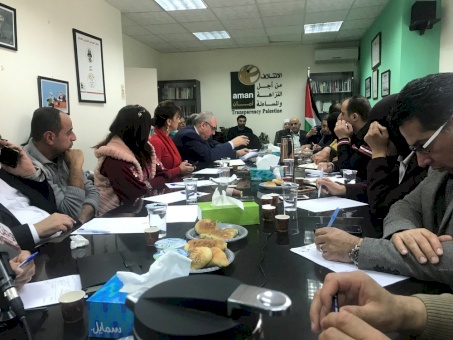
Ramallah – In the context of its attack and violation of international laws and conventions, Israel has recently decided to seize and freeze a total of NIS 502 million of Palestinian clearance revenues, claiming that this amount had been paid by the Palestinian National Authority (PNA) to the families of martyrs, injured citizens and prisoners in 2018. Against this background, the Civil Society Team for Enhancing Public Budget Transparency held a session to look into the impact of this unjust decision. The session came up with recommendations to challenge and confront the Israeli decision without prejudice to Palestinian citizens’ rights and public service delivery.
The session brought together a number of economics, academicians, and civil society representatives. Participants stressed the need to make decisions to find a long-term solution for this crisis. The current crisis is not born of the moment, but is a prelude to a more intractable one. Taking place once in a while, this crisis is manipulated by Israel, which uses Palestinian clearance revenues to exert pressure on the PNA. An insightful strategic vision is needed to address this issue. Participants emphasised that economic gains should not be traded with the Palestinian rights and national principled values. A serious approach to austerity and rationalisation should be embraced. In addition to reducing net lending, tax evasion should be combated. Decisions of the Palestinian National Council on the review of the Paris Protocol and Palestinian-Israeli economic relations should be complied with.
Participants unanimously agreed that the current crisis would require a planned confrontation and management on the short run. To this effect, the distribution of all budgets will be revisited. Security sector expenditure, which takes up the lion’s share of the public budget, will be decreased. According to recommendations of the Report on Rationalisation and Austerity in Government Spending (Civil Society Team for Enhancing Public Budget Transparency, 2015), austerity and rationalisation will be in place in relevant sectors. If best practices are implemented, Dr. Nasser Abdul Karim estimated this would save almost US$ 300 million. While all luxury expenditures are eliminated, a belt-tightening policy will be in place. A systematic plan will be developed to combat tax evasion, which is in excess of US$ 500 million. Participants also stressed the need to address net lending, which accounts for more than NIS 1 billion a year.
Firas Jaber, researcher of the Social and Economic Policies Monitor, reviewed the impact of the Paris Protocol, which has undermined and maintained control over the Palestinian economy. The Paris Protocol elicits lasting control over Palestinian clearance revenues. Almost 25 percent of income tax revenues of officially registered workers in Israel is not transferred. Over a time span of 50 years, billions of dollars have been unjustifiably withheld by Israel. According to the United Nations Conference on Trade and Development (UNCTAD), financial leakage was as much as US$ 305 million as a result of importation through Israeli agents. Jaber explained that solutions need to be devised to reduce the amount and contribution of clearance revenues to the budget funding. To this avail, promotion of imports from neighbouring countries, namely Egypt and Jordan, will reduce the losses caused by financial leakage. Local production sectors will be promoted, reliance on imported products reduced, and Paris Protocol reviewed.
In his opening remarks, Dr. Abdul Karim made clear that the current crisis was a prelude to a broader and more challenging one. Israel’s piracy and the measures taken by the Palestinian government to address the crisis affect citizens’ lives. According Dr. Abdul Karim, Palestinians can control the current crisis. However, the problem lies in strategic plans, which are needed to confront the most comprehensive challenge and change the course of the relationship with the Israeli side. While this crisis is associated with available liquidity, a more serious problem concerns public finance management and chronic deficit, which need to be addressed.
Dr. Wassel Abu Yousef, spokesman of national and Islamic factions, asserted that Israel’s decision to plunder the Palestinian people’ funds was a consequence of a series of US decisions to impose the Deal of the Century. This should be challenged by concerted Palestinian efforts and boycotting Israeli products.
Some researchers and economists explored how serious the government decision to refuse clearance revenues could be. Experts wondered whether this step was part of informed plans to manage the current crisis. They also questioned how capable citizens would be to afford the consequences of this measure. In particular, decisions have been made to transfer 50 percent of the wage bill to public sector staff with salaries ranging from NIS 2,000 to NIS 10,000. In other words, this decision will inevitably affect the purchasing power and economic situation of public sector employees. It is worth noting that more 100,000 people are employed in the civil and security sectors.
